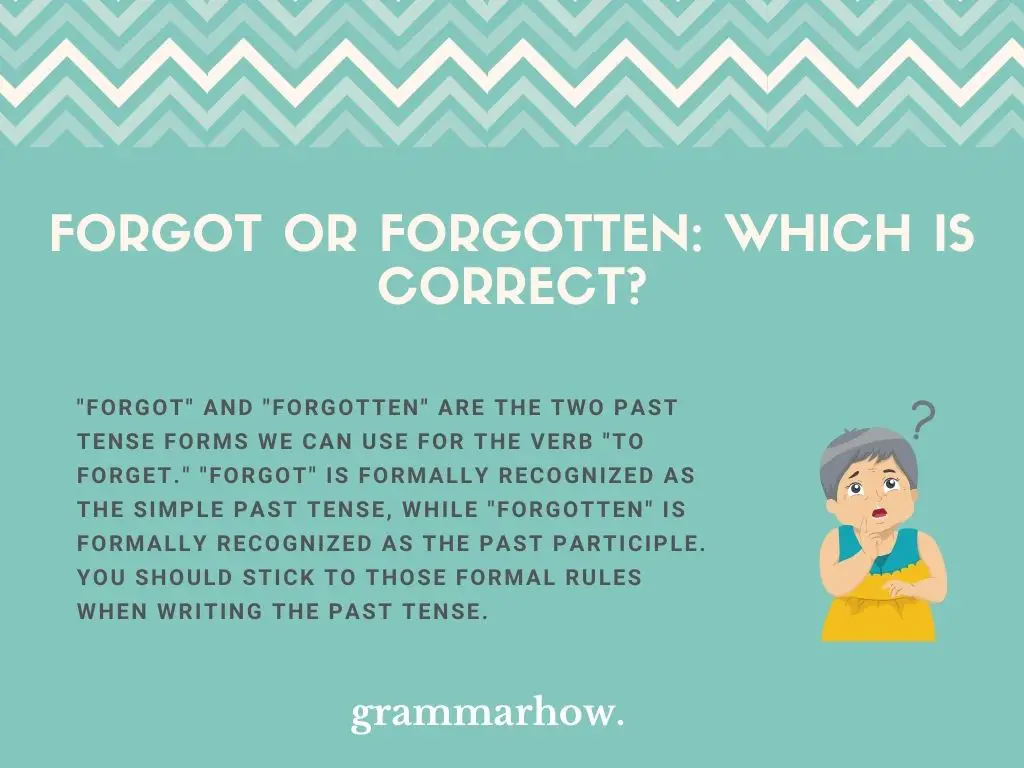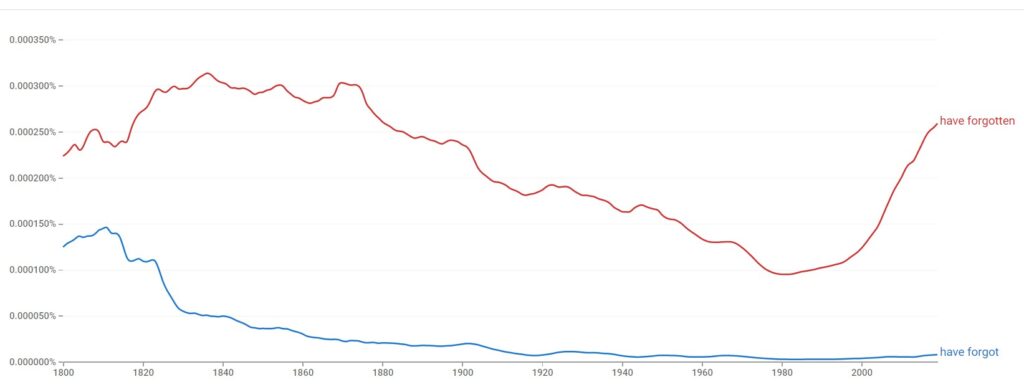Some irregular verb forms come with different past tenses that we need to understand. The past tense of “forget” is one such word, and this article will explore how to use the simple past tense and past participle correctly.
Forgot or Forgotten: Which Is Correct?
“Forgot” and “forgotten” are the two past tense forms we can use for the verb “to forget.” “Forgot” is formally recognized as the simple past tense, while “forgotten” is formally recognized as the past participle. You should stick to those formal rules when writing the past tense.

These examples might help you to understand the key differences.
- I forgot to mention that I’ll be out of town tonight!
- You have forgotten all about our wedding anniversary, haven’t you?
You might benefit from learning about these forms too:
| Verb | Forget |
| Past | Forgot |
| Past Participle | Forgotten / Forgot |
Some people use “forgot” as the past participle in spoken English. Informally, this is fine. However, you should avoid using “forgot” as the past participle in written English.
When Is “Forgot” Correct?
“Forgot” is correct when used as the simple past tense. We do this to talk about “forgetting” something in the past and thinking about whatever it is we “forgot.”
Some people use “forgot” as the past participle as well, but we don’t recommend you do this. There are no grammatical cases where “forgot” works as the past participle unless you use it in spoken English (since the rules are more relaxed there).
Example Sentences Using “Forgot”
We only want to focus on “forgot” as the simple past tense. While we touched on it being somewhat correct informally as the past participle, that doesn’t mean you should find a use for it in written pieces.
- You forgot to mention that it would be difficult to achieve!
- We forgot to tell you about our adventure!
- I forgot about my homework.
- She forgot that we were supposed to meet for a date.
- They forgot all about you!
- He forgot to tell me what he was so desperate to say.
“Forgot” is the simple past tense; we use it to talk about “forgetting” something in the past and remembering what happened. Usually, “forgot” works to tell someone what it is you’ve “forgotten” to mention or do.
While it’s not formally correct, you might occasionally see “forgot” as the past participle.
- You have forgot everything I taught you.
- I have forgot what you wanted me to do.
It’s not wise to use this in writing. You should only do so in spoken English because it’s acceptable there.
When Is “Forgotten” Correct?
“Forgotten” is the only correct past participle form we can use in written English. It would help you to understand more about it and when it’s correct, so pay attention to this bit!
“Forgotten” is correct when we include a helping verb with it. That means verbs like “have” are useful, and the phrase “have forgotten” becomes the present perfect tense. This is one of three possible tenses we can use with a past participle.
The other tenses can all be shown as follows:
- Past perfect: Had forgotten
- Present perfect: Have forgotten
- Future perfect: Will have forgotten
You’ll notice that “forgotten” never changes form, regardless of the tense we use. However, “have” changes tense based on which perfect tense we’re using, and it would help for you to remember the different tenses.
Example sentences using “Forgotten”
Since “forgotten” is the correct past participle form, we’ll show you each of the three present tenses in different sections.
Past Perfect
- You had forgotten what was important to you before I came along and told you.
- She had forgotten her way, but I managed to help her.
“Had forgotten” refers to someone “forgetting” something in the past that came before another past event. We usually use the past perfect tense to talk about the order things happened in the past.
Present Perfect
- You have forgotten everything I’ve taught you, and I am saddened.
- We have forgotten our way back to the plant!
“Have forgotten” means that someone started to “forget” something at some point in the past. They have continued to “forget” that thing in the present, and it has affected their present state in some way.
Future Perfect
- You will have forgotten everything I said to you by the morning.
- She will have forgotten this encounter tomorrow; you can trust me on that.
“Will have forgotten” means that someone is likely to “forget” something in the future. However, that action is dependent on the actions we take in the present as to whether or not it’s a guaranteed thing to happen.
How “Forgotten” can also be used as an adjective
We can use “forgotten” as an adjective as well as the past participle of “forget.”
“Forgotten” means that someone or something is lost in time or not thought about a lot. We use it to talk about old things or things that aren’t worth remembering.
Example sentences using “Forgotten” as an adjective
- The forgotten artifact is somewhere in these ruins.
- My forgotten dreams are slowly coming back to me.
- He is forgotten, and you must move on from him.
“Have Forgot” Vs. “Have Forgotten”
We’ve briefly mentioned that “forgot” is an informal past participle form. It’s mostly used in spoken English since the rules are more relaxed in speaking. However, can we use it to create the perfect tense in the same way?
According to Google Ngram Viewer, “have forgot” is used occasionally, but it’s very rare compared to “have forgotten.” It’s much better to stick to “forgotten” as the past participle, as it’s the correct form and the only one that’s formally recognized.

- Correct: I have forgotten everything you told me!
- Incorrect: I have forgot what you wanted me here to do. (However, this sentence can work in spoken English)
Final Thoughts
“Forgot” is the simple past tense, though there are informal cases where some people use it as the past participle. However, if you want to remain grammatically correct, remember that “forgotten” is the most suitable past participle that you should use.
You may also like: Forbade or Forbidden? Past Tense Of “Forbid” (Helpful Examples)

Martin holds a Master’s degree in Finance and International Business. He has six years of experience in professional communication with clients, executives, and colleagues. Furthermore, he has teaching experience from Aarhus University. Martin has been featured as an expert in communication and teaching on Forbes and Shopify. Read more about Martin here.
